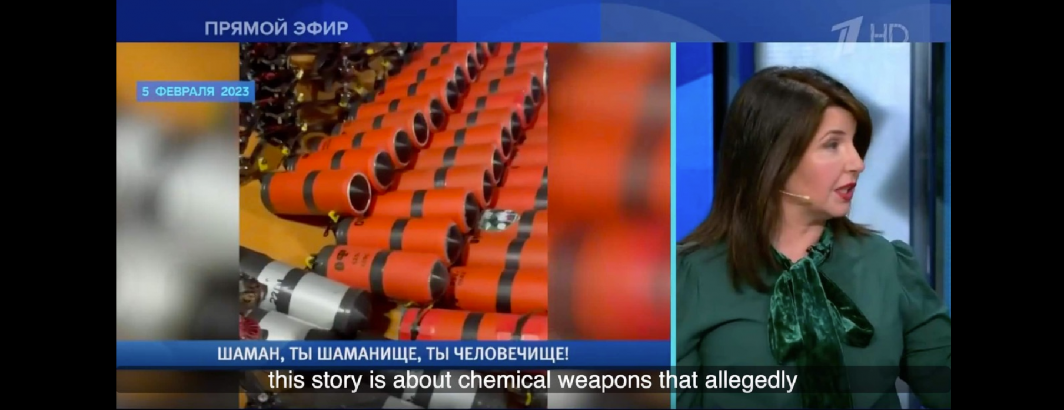
On February 6th, on a day in which Russian TV news coverage was dominated by reports of the massive earthquakes in Turkey, another story was emerging, this one claiming to document threats of drone-delivered chemical agents by Ukraine against Russian forces in Ukraine’s Donetsk region. Russia news wire services were first to carry word that Russia's state Investigative Committee has said that it was examining the alleged use of chemical weapons by Ukrainian forces near the eastern Ukrainian towns of Soledar and Bakhmut. The Ukrainian military was reported by other services to have denied use of such weapons.
Three Russian TV networks aired stories to the Russian investigations of Ukrainian chemical weapons use, throughout the day, all using brief video footage reportedly from a “Ukrainian military blogger” who claimed canisters he displayed on a table and in a freezer were chemical agents meant to be dropped by drones to kill Russian military personnel.
Despite the seemingly incendiary nature of the reputed use of chemical weapons, most of the reports included journalists and other analysts suggesting that the chlorine-based agricultural compound reportedly used by Ukrainians would be relatively ineffective at achieving any significant military objectives. Some of the televised discussants speculated that such threats were intended to provoke a Russian over-reaction.
Channel One Russia was first to report on the investigation of drone delivered chemical munitions in their noon program with a 16-minute segment, starting here in Visual Explorer:
The report also noted that Russia is said to have destroyed its stockpiles of far more deadly chemical weapons and that the US has not finished doing so. Mention was also made that it was 20 years ago on February 2nd, that then-US Secretary of State Colin Powell asserted, incorrectly, to the UN that the US had proof that Saddam Hussein’s Iraq had secret stores of chemical and biological weapons.
Subsequent reports on February 6th, also the utilizing video from the reputed Ukrainian military blogger and some with greater emphasis on potential deadly effects:
- Channel One Russia at 2:02 PM
- Russia-1 at 7pm
- Russia-24 at 8:02pm
- Russia-24 at 8:47pm
- Russia-24 at 10pm
- Russia-24 at 10:30pm
- Russia 24 at Midnight
Perhaps most interesting about this story is that, despite its mediagenic nature in advancing Russia's claims regarding its invasion of Ukraine, other than a brief burst of mentions, the story was not heavily promoted and quickly faded away, suggesting even Russian media declined to run with the story.
This analysis is part of an ongoing collaboration between the Internet Archive and its TV News Archive, the multi-party Media-Data Research Consortium and GDELT.